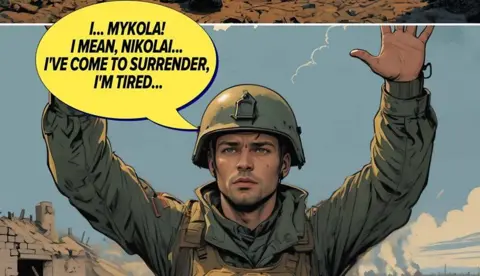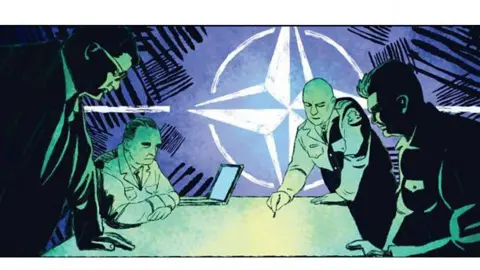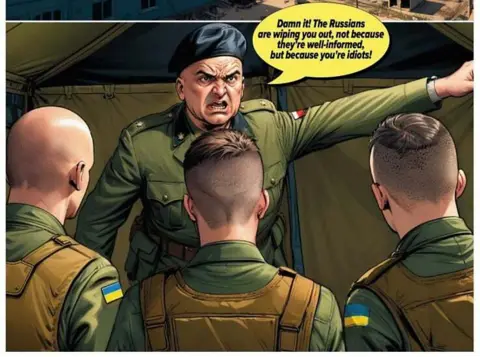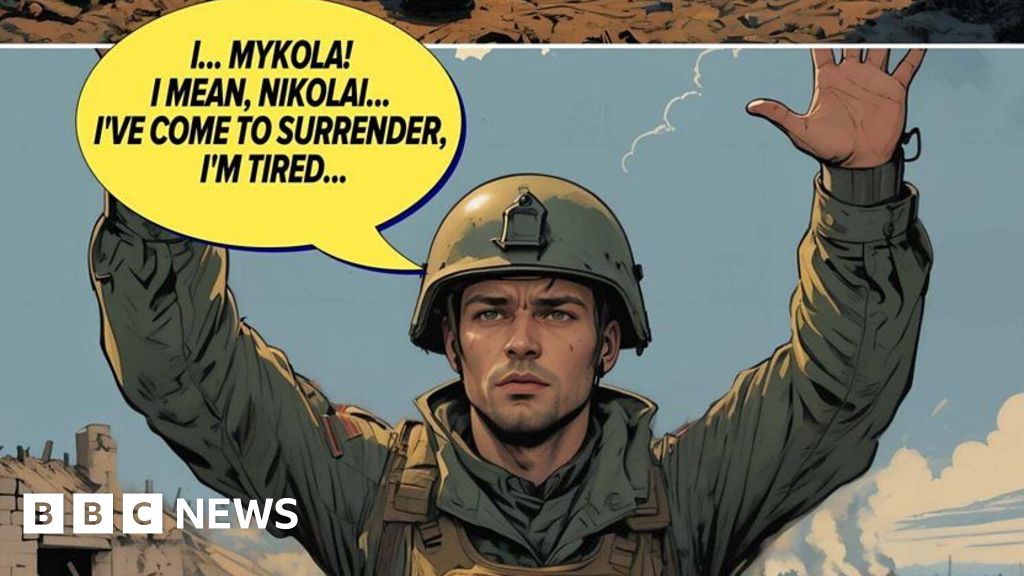Sandro Gvindadze,BBC Monitoring, Tbilisi
 Rybar.ru
Rybar.ruWar-themed comic books are being used by the Kremlin to sell its vision of the war in Ukraine to the youth.
During the first months following the start of invasion of Ukraine, a poll by the Russian state pollster suggested that young Russians were the least supportive of the war.
It now seems the Kremlin is taking steps to ensure that changes.
In April, the Russian defence and education ministries started distributing tens of thousands of comic books that praise the invasion of Ukraine in schools across Russia and Ukraine’s Russia-occupied territories.
According to the project’s official website, the goal is ultimately to supply these comics to every school under Russian control.
The comics consist of 22 short stories dedicated to Russian servicemen decorated for their role in the war.
They echo the Kremlin’s unfounded claim that Russia’s full-scale invasion of Ukraine in February 2022 prevented a “genocide” planned by Kyiv authorities in eastern Ukraine and backed by Nato countries.
Among the protagonists is Col-Gen Azatbek Omurbekov, the commanding officer of the unit responsible for the killing of civilians in the Ukrainian town of Bucha in 2022.
The comic book describes Mr Omurbekov as a “real man” and claims that his troops have shown “humanity” during the first months of the war in Ukraine.
“As they [Ukrainian soldiers] retreated, the enemy abandoned their wounded. Russian soldiers gave them first aid – even in war, one must remain human,” the comic reads.
In fact, Russian troops have been accused of torturing and killing Ukrainian prisoners of war by major rights groups, including Amnesty International and the United Nations human rights monitoring mission in Ukraine.
The books were written by Oleg Roy, a prominent Russian children’s author and a vocal supporter of the war in Ukraine.
The comics employ the anti-Western, anti-Nato and anti-Ukrainian rhetoric long peddled by Russian authorities. “Out of hatred for Russia, the West arms their puppy neo-Nazis in occupied Kyiv,” one of the books reads.
Mr Roy previously created a series of comics devoted to patriotic “Russian superheroes” which were praised by Kremlin-backed media as Russia’s “answer to DC and Marvel”.
 geroisvo.znanierussia.ru
geroisvo.znanierussia.ruIn September 2023, another series of 23 war-themed comics was issued by prominent military blogger Mikhail Zvinchuk, who is also part of the Russian Presidential Council on the War in Ukraine. These comics were translated in English, Arabic and Chinese.
The stories they tell claim to be based on real-life situations from the war in Ukraine. They highlight the courage and determination of Russian soldiers, while derogatory language is used to describe Ukrainian soldiers, who are portrayed as pawns of Western generals.
Some of the stories also echo the narratives of Russian state-controlled media, claiming that Ukrainian soldiers lack the motivation to fight, as their commanding officers send them to die.
One of Zvinchuk’s comic books describes the battle for the eastern Ukrainian village of Klischiivka, which Russia has since claimed to have captured.
It tells the story of a Ukrainian soldier named Mykola, who surrenders to Russian troops, shoots members of his own battalion and changes his name to Nikolai, the Russian variant of his name.
In another issue, two Ukrainian drone operators are desperate and forced to surrender, because they cannot handle the might of Russian armoured vehicles, which one of them calls “cyborgs”.
Mr Zvinchuk’s comics were showcased as part of an art exhibition set up on a train that travelled across Russia.
The train featured nine thematic cars depicting the “heroism” of Russian soldiers, starting with World War Two and ending with the war in Ukraine.
According to official data, more than half a million people visited the Ministry of Defence-backed initiative, which was dubbed The Power of Truth. The train covered more than 34,000km (21,200 miles), stopping in more than 75 cities between Moscow and Russia’s Far East.
 Rybar.ru
Rybar.ruAnother series of Ukraine war-related comics is centred around the exploits of the Russian Wagner mercenary group and its late founder, Yevgeny Prigozhin – although this series appears to have no official backing.
Wagner mercenaries have been involved in wars in Ukraine and in Syria. Prigozhin died in plane crash on 23 August, exactly two months after he led a short-lived mutiny during which his fighters to took over key military installations in southern Russia and began marching towards Moscow.
The comics – which were published at the end of 2023 on social media platform Telegram – glorify Wagner mercenaries and claim they saved Russian speakers in eastern Ukraine from “genocide”.
The protagonist is a Wagner mercenary called Angel of Wrath, who is depicted fighting blue dog-like creatures wearing the Ukrainian coat of arms.
In the comic, these creatures are seen turned into monsters because of the “new serum that the Americans are injecting them with”.
One of the issues in the series ends with Prigozhin giving an ominous warning: “What they [enemies of Russia] don’t know is where the Angel of Wrath will appear next. And so, let everyone wait and fear.”


